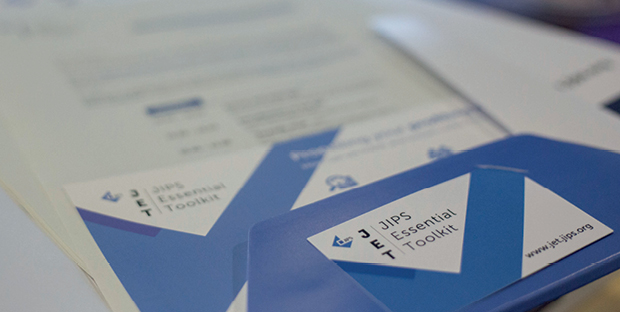A practical toolkit for field practitioners that is easy-to-use, field-tested and adaptable to your specific context: this was our ambitious goal when we set out to completely revise the JET – JIPS Essential Toolkit – last year.
Dear colleagues, we are pleased to introduce to you today the just-launched JET: it reflects current good practices and includes many concrete and practical examples, building on our expertise in supporting collaborative profiling processes in various displacement contexts. It uses clear language and we also made it much more visual so that key concepts can easily be captured and understood by practitioners in the field. Instead of a heavy guidance product, the Toolkit comes along in a handy format with individually downloadable tools for each stage of a profiling.
Whether you are an assessment officer with a strong technical background but are always looking for tips and tricks on how to implement your data collection exercise, or a protection officer who has just been assigned as a focal point for a profiling exercise and needs an overview before getting started: the JET has tools, methodology guides and hands-on recommendations ready for you to support your own exercise.
The JET compiles diverse resources to help you undertake a profiling exercise from start to finish. It gives you an overview of what profiling is and how it can support the work in your context, and walks you step-by-step through each of the six profiling phases. It provides templates that can easily be adapted to a specific context and worked on together with partners, as well as guidance documents helping you through trickier parts of the process, for instance deciding on a sampling strategy or processing the data collected from a questionnaire. The Toolkit has also been included in the SDG Acceleration Toolkit to help make IDPs visible in the SDGs.

The JET guides you through the whole profiling process, step-by-step.
Building on JIPS’ experience supporting profiling exercises in different contexts in the field, the Toolkit was first released in 2013. With the technological developments over the past five years and the continuously evolving practices in profiling and other data collection approaches, we felt this makeover was much needed and made it a focus of our work in 2017.
Re-imagining the JET meant not only revising all the content, but also refreshing the design of the toolkit, including the interface. At a focus group discussion conducted in July 2017 with participants of JIPS’ Profiling Coordination Training, we gained insights about the strategies colleagues use when looking for specific tools.
While focusing on collaborative profiling of displacement situations, the JET also features various links to external resources that we ourselves use in our work in the field and that complement the JET tools in specific thematic areas, such as UNHCR’s Needs Assessment Handbook, Multi-Cluster Indicator Surveys (MICS), ACAPS’ assessment resources, tools adapted to urban contexts for instance IRC’s context analysis toolkit, or the Protection Information Management guidance.
Rather than talk about the JET in the abstract, we invited Steph Matti, Profiling Coordinator of the Sittwe camp profiling in Myanmar 2016-2017, to join us at the JET launch event on December 13th, 2017 in Geneva to give us a taste of the reality on the ground. The Sittwe camp profiling is in fact a great example of where the JET tools were widely applied. It is also a rich source of practical experiences for the Toolkit on how the profiling process can be shaped to adapt to field realities and what collaboration entails along the way.

Launch of the new JET with colleagues from various organisations (Geneva, December 2017).
Building on our recent discussion with Steph about a typical day in the life of a Profiling Coordinator, this time we asked her reflections about the main challenges she encountered in that role and how she resolve them. Establishing, sustaining and managing a collaborative process was certainly one of the key issues she had to deal with along the profiling process, especially in relation to the following aspects:
Here is how she addressed these questions together with profiling partners in-country: before getting started with data collection, a large-scale awareness raising campaign was conducted through traditional means as well as in-person meetings with camp management committees, enumerators from the IDP camps, etc. Local and state authorities were also involved from the beginning of the exercise.
To foster and sustain collaboration, stakeholders were brought together by cluster, i.e. experts per topic. As a result, the Sittwe camp profiling report offers an in-depth analysis and comprehensively covers all cluster topics touched by the profiling exercise, such as camp population, education, shelter, water and sanitation, communicating with communities, etc. Steph welcomed the launch of the revised JET toolkit as it would help coordinators such as herself improve the quality of their work in the field as well as better plan ahead.

Steph Matti, Profiling Coordinator of the Sittwe camp profiling in Myanmar (2016-2017) joined us to launch the JET.
The launch of the new JET tools and interface is just the start of the discussion: more work needs to be done to continue improving profiling practices and developing resources for better, more rigorous, and more collaborative data collection to understand the effect that displacement has on people and places around the world.
We are already working hard to add additional tools and guidance throughout 2018 – go ahead and explore the Toolkit, spread the word and let us know your suggestions!